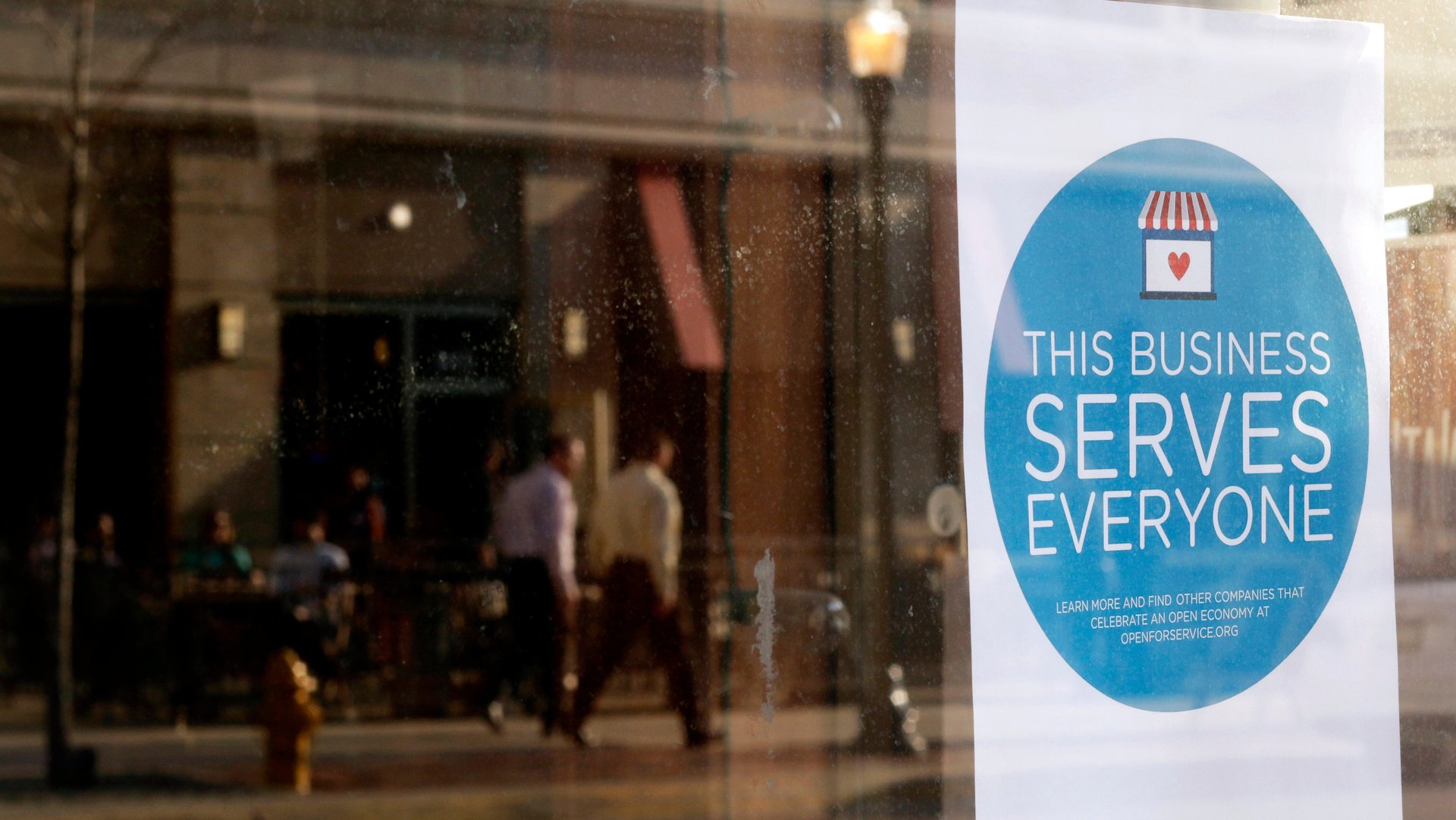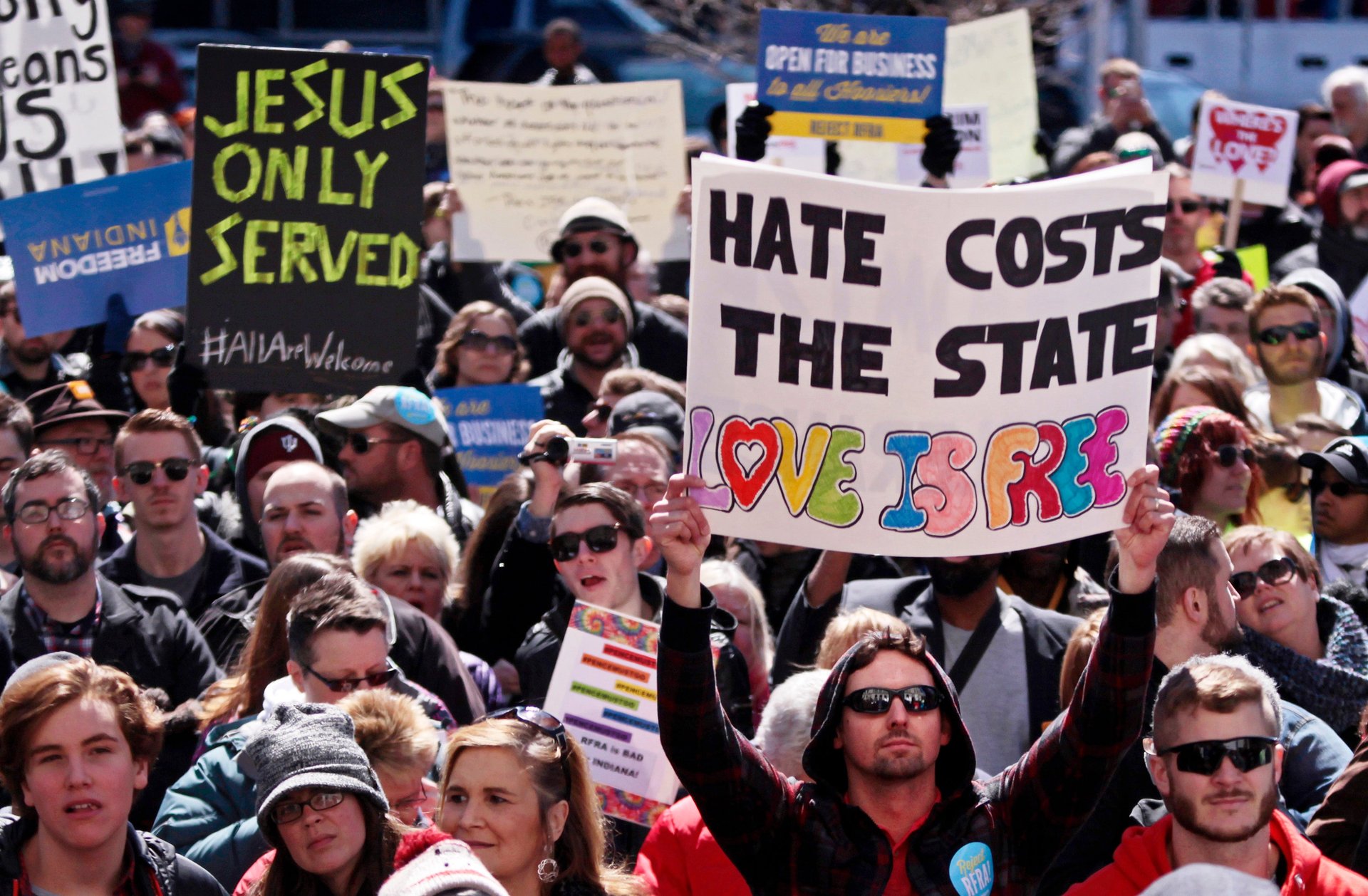Boycotting Indiana won’t fix America’s discrimination problem
Less than a week after signing Indiana’s Religious Freedom Restoration Act (RFRA) into law, Governor Mike Pence of Indiana held a press conference on Mar. 31 to call upon the state legislature to amend his controversial new law. He said he wanted to clarify that the RFRA does not authorize businesses to discriminate against gays and lesbians.


Less than a week after signing Indiana’s Religious Freedom Restoration Act (RFRA) into law, Governor Mike Pence of Indiana held a press conference on Mar. 31 to call upon the state legislature to amend his controversial new law. He said he wanted to clarify that the RFRA does not authorize businesses to discriminate against gays and lesbians.
The governor’s announcement follows several days of bad press for the state, including an editorial that dominated the front page of The Indianapolis Star with the headline: “FIX THIS NOW.” Critics, including prominent business leaders like Apple CEO Tim Cook, have blasted the new law for permitting individuals to cite personal religious beliefs to justify refusing service to some customers. In the wake of the law’s passage, companies and local governments have prohibited non-essential travel to Indiana, some companies have suspended plans to expand their presence in the state, and calls for a statewide boycott are trending on Twitter.
Although Pence insists that RFRA does not sanction discrimination, some proponents of the legislation, including conservative lobbyists invited by Pence to the bill signing, argue that the law operates as a “trump card” to exempt religious businesspeople from nondiscrimination provisions that clash with their faith. LGBT rights advocates were not surprisingly quick to call foul.

But the backlash is interesting not so much for what it reveals about anti-discrimination laws in the US, as for what it may inadvertently be obscuring.
Indiana is one of 29 states that has never prohibited discrimination based on sexual orientation in public accommodations or private employment. Indeed, under pre-existing state law, businesses in Indiana can refuse to serve lesbian customers or fire an employee for marrying a same-sex spouse—whether motivated by religious belief or for any other reason. None of this would change under Pence’s proposed clarification of RFRA or even if Indiana repealed the law in its entirety this afternoon.
What the Indiana RFRA does do, however, is expand on and broaden the language of the previous state and federal statutes—Congress passed a watered-down version in 1993— that may have inspired it. As the Atlantic’s Garrett Epps notes:
The Indiana law explicitly allows any for-profit business to assert a right to “the free exercise of religion.” The federal RFRA doesn’t contain such language, and neither does any of the state RFRAs except South Carolina’s; in fact, Louisiana and Pennsylvania explicitly exclude for-profit businesses from the protection of their RFRAs.
So is this latest state RFRA worse than the bills that preceded it? Short answer, absolutely. But we can’t lose sight of the bigger picture here.
Congress has repeatedly failed to enact federal legislation that would prohibit discrimination nationwide by private parties on the basis of sexual orientation. The Democrats did not pass such legislation during the first two years of president Obama’s administration, when the party held commanding majorities in both houses of Congress.
Meanwhile, the Employment Non-Discrimination Act finally passed the Senate in 2013, by a bipartisan (and filibuster proof) vote of 64-32, only to die in committee in the Republican-led House of Representatives. And this legislation, advanced for years by a coalition of Democrats, moderate Republicans, and civil rights groups, would only apply to employment decisions—not to businesses such as the florist or bakery that refuses to serve gay and lesbian customers.
Indiana’s attitude towards LGBT discrimination is not an exception to the rule here—it is merely expanding on what was quietly already the rule of law in much of the US.
Worryingly, the public appears largely misinformed about this legal reality. While large majorities in public opinion polls favor legislation that forbids businesses from discriminating against gays and lesbians, they also believe that existing law already offers such civil rights protection. For example, in a 2013 poll conducted by the Human Rights Campaign and the Third Way, more than half of respondents incorrectly believed that a company’s refusal to provide products or services to a gay customer was illegal in their state.
Indiana is a convenient target for protesters right now, and understandably so: it is much easier to protest the passage of a single RFRA than years and years of frustrating legislative inaction. And the fact that the RFRA is likely to prompt future legal challenges to civil rights laws—including in large Indiana counties and municipalities that currently forbid discrimination based on sexual orientation by local ordinance—is yet another frustrating setback for LGBT rights advocates.
But the intense focus over the last week has also tended to reinforce public misconceptions, promoting the belief that Indiana’s RFRA sanctions some new form of discrimination that was not already permissible under state law. This arguably makes it harder to generate the public pressure necessary to change the law at the state or federal level.
The simple fix, aside from somehow clarifying that RFRA does not license discrimination, would be to add sexual orientation as a protected classification under the state’s civil rights law. And there is growing pressure on Indiana to do exactly that, one positive consequence of the public debate. If anything, the biggest silver lining of the Indiana RFRA backlash has been the increased awareness of LGBT discrimination issues across the country. Such awareness will be wasted, however, if advocates and officials do not act swiftly to channel the anger in the right direction.
As far as Indiana goes, although Pence appeared to agree at today’s press conference that discrimination against gays and lesbians should be illegal, he also has said multiple times that expanding the state’s civil rights law is a separate issue—one that is “not on my agenda.”
Instead, the governor places his faith in the people of his state. As he told ABC News on Sunday: “Hoosiers don’t believe in discrimination. . . . People tell me when I travel around the country, gosh, I went to your state and people are so nice.” In other words, gay and lesbian citizens of Indiana can always rely on the kindness of strangers.
We welcome your comments at [email protected].